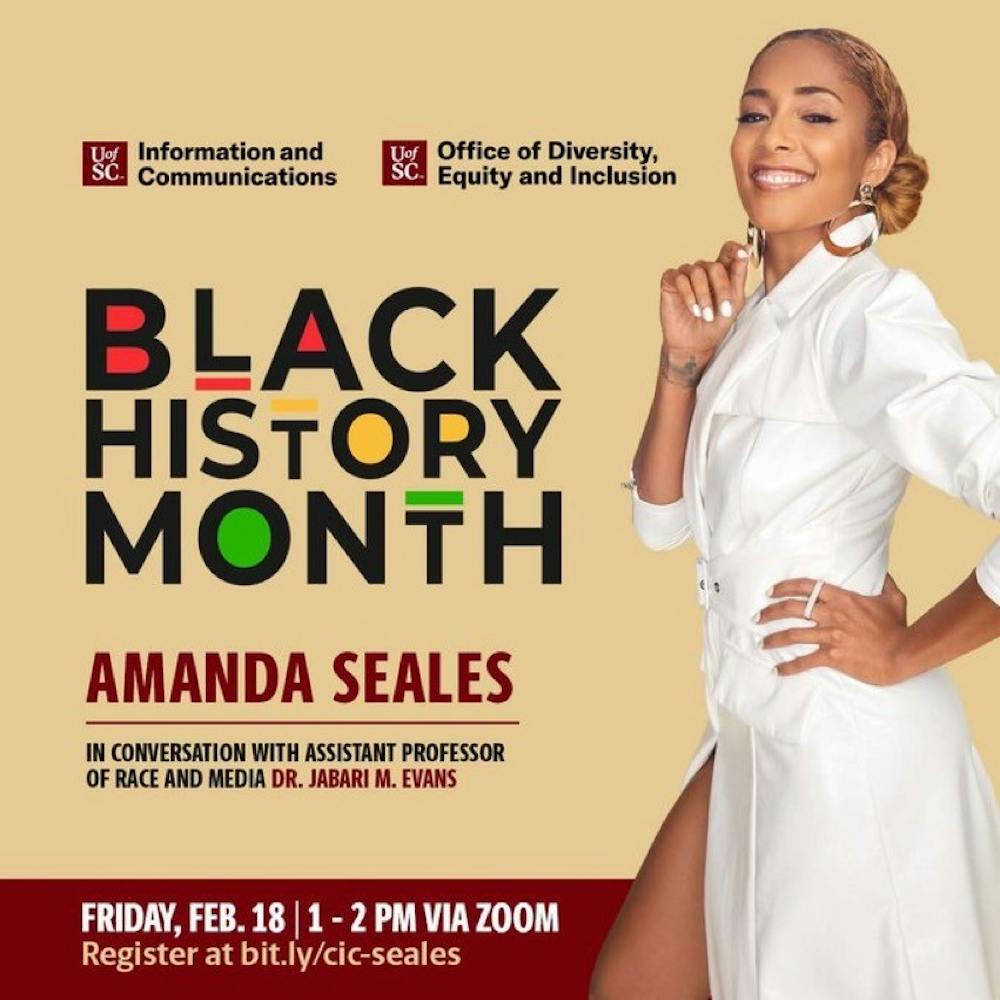Entertainment personality Amanda Seales took a look back on her career in entertainment as part of a Black History Month conversation at USC on Feb. 18. The conversation brought some humor to social justice issues and talked about how Seales sees race, diversity, equity, and inclusion today.
The Black History Month conversation, which was held virtually, allowed students to hear Seales' first-hand experiences working in the entertainment sector.
Seales got her start as a child actress on “My Brother and Me,” Nickelodeon’s first show centered around a Black family.
A few years later, Seales became a video jockey for MTV, according to her website. This was one of the various roles that led to her present position as host and creator of the game show "Smart, Funny & Black."
On top of her titles which include comedian, actress, producer, podcaster and writer, Seales has her master’s degree in African American Studies from Columbia University. The degree sat on the wall of her bright pink office in the background of the event.
"(Seales is) completely a champion for social justice and women’s rights, as well as all things Black Folk," Assistant Professor of Race and Media, Jabari Evans, said.
Evans came up with the idea of the event and served as a moderator of the conversation.
Evans said he chose Seales for the event because of the way she has used tools like social media. Seales uses social media to her advantage in advocating for social justice issues and to showcase her work in mainstream media. Through all of her jobs in entertainment, she has chosen to remain herself. Seales who is known for being outspoken on topics she cares about, has walked away from jobs where she felt she couldn't speak freely on social justice issues.
"(Seales) also is what I would consider the new version of what a media personality should be striving to be," Evans said.
The ability to be authentic and easily approach issues, such as race and gender, is what Seales said led her to comedy. She said she thinks comedy is a safe space to have all of the personality traits people attribute as negative. With that, there is a lot of solidarity in comedy that is not in the acting or music industry, Seales said.
Her comedic personality shined brightest when Evans asked about the importance of social media in Seales' career. Seales answered with a comedic quickness and wittiness in her tone and delivery.
Particularly, Seales spoke of the time she verbally “gathered Caitlyn Jenner like a ponytail” during a YouTube event. Seales said she felt that Jenner failed to see her privilege in America and the differences between her and Seales' experiences. The viral clip changed her life overnight, she said.
Subsequently, Seales went on to say that diversity and inclusion are not the same.
"They are not cards to be exchanged for. (It's not like) we got a trans person, so now we don't need to get a gay person. We got a black person, now we don't need to get a Latinx person," Seales said.
Seales said she believes when looking at the power structures of networks within media, people in power need to make room for others to have equal power for equity and inclusion to take place within media.
Challenging racial and gender bias in the entertainment industry is a continual effort, Seales said. She said it is important to find allies and foster those relationships.
This ended the conversation on a note that highlighted one of the many purposes of the conversation, which is to create a pipeline and pathway to increase the representation of underrepresented students in the media industry, according to Dr. Shirley Carter, Associate Dean for Diversity, Equity, and Inclusion of the College of Information and Communications.
"We have created our initiatives to foster awareness and build an inclusive culture," Carter said by building student awareness of career opportunities in the media and providing the chance to build and foster amongst themselves career-lasting relationships in media.

